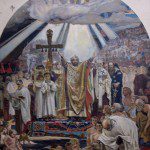This is the fourth and final post from a series on the sacrament of baptism.
Click Here For Part One Click Here For Part Two Click Here For Part Three
![Dove of the Holy Spirit (ca. 1660, stained glass, Throne of St. Peter, St. Peter's Basilica, Vatican) by Dnalor 01 (Own work) [CC BY-SA 3.0 at (http://creativecommons.org/licenses/by-sa/3.0/at/deed.en)], via Wikimedia Commons](https://wp-media.patheos.com/blogs/sites/637/2017/05/Rom_Vatikan_Basilika_St._Peter_Die_Taube_des_Heiligen_Geistes_Cathedra_Petri_Bernini-222x300.jpg)
The action is called baptism because that is what is done by those who are brought into the body of Christ. The Holy Spirit, sent by Christ, brings the forgiveness of sins and integration into Christ for those who thus go through the ritual of baptism. It is a onetime ritual, a onetime event, so that it cannot be repeated again. What is key is the grace of the Holy Spirit which is imparted from it. That grace is what is imparted in baptism, and since it comes out of baptism, indeed, since it is what we know as the normal way we receive that grace, that grace itself is designated as baptism itself. But, as the Holy Spirit is not controlled by us, as the Holy Spirit will go wherever it shall desire, the Holy Spirit can give the grace of baptism to those who have not undergone the ritual of baptism; they have the thing itself, and so can be said to have been born again and even said to be baptized so long as we understand that to mean they have received the grace of baptism without the ritual itself.
If we understand what Christ wants us to do, we are bound to follow his expectations as long as it is possible for us to do so. However, God is not bound by his expectations. He freely grants forgiveness to those who follow him and do as he asked, but he is able to give his grace to others as he sees fit. The grace given not just in baptism, but in any and all of the sacraments, are not to be limited by the way the church is told to give it. We know if we follow the sacraments in the way Christ set them up, he freely uses the sacraments as vessels of grace. The church out of fidelity and love obeys Christ and distributes sacramental graces accordingly, not as a way to control God, but as a way to be faithful to God. Nonetheless, if God wants to act with others in his own free pleasure, God is free to do so; his grace is not limited by the sacraments given in the church, as St. Bonaventure explained:
Lastly, because through such sensible signs the divinely instituted grace of the Holy Ghost is received and is discovered in them by those to whom they are presented, the sacraments are called the vessel of grace, and the cause of grace. This is not because grace is contained substantially in them or effected causally in them, since it can be made to reside in the soul alone and can be infused by God alone, but because in them and through them the grace of our cure ought to be infused by the great physician, Christ, by divine decree, “although God does not bind His power in the sacraments” (Peter Lombard, Quattuor libri sententiarum, IV, 1, 5). [1]
There is, therefore, the act of baptism with its grace, but there is also the grace of baptism, the thing in itself, which can still be called baptism because it is the grace of baptism, which the Lord can give to those who, for no fault of their own, have not been ritually baptized. The church knows the Lord can and has given such grace to others; for example, those who lived before the time of Christ and so before the sacrament of baptism were able to be saved, and many of them have been declared saints which should serve as proper demonstration of this fact. If the ritual was itself what was absolutely required, and not the grace, then those born before Christ would have not been able to attain salvation; likewise, his Mother, Mary, would also not have been purified by grace and could hardly have been “full of grace” at the conception of Christ. Yet, as Godfrey of St. Victor explained, Mary had to have had the grace found in baptism, to be reborn through the Holy Spirit, for her to be full of grace, and so she could and should be said to be reborn by baptism despite not having had the ritual itself:
For the blessed Virgin is believed to have been first among all persons eventually to be reborn through the grace of baptism, who alone are properly and specifically called persons or members of the Church. For one should not believe that she, who, as it were, merited being the fount and bearer of grace, did not receive the grace of baptism in a supreme way. We believe that she obtained this grace completely, if not at some other time than at the time when the Holy Spirit came upon her and the power of the Most High overshadowed her and she conceived this very Grace in her womb. O how truly did the Spirit come upon her baptize her in spirit and in fire. [2]
![Forty Martyrs of Sebaste by Anagoria (Own work) [GFDL (http://www.gnu.org/copyleft/fdl.html) or CC BY 3.0 (http://creativecommons.org/licenses/by/3.0)], via Wikimedia Commons](https://wp-media.patheos.com/blogs/sites/637/2017/05/09XX_Forty_Martyrs_of_Sebaste_anagoria-220x300.jpg)
I have in mind those unbaptized persons who die confessing the name of Christ. They receive the forgiveness of sins as completely as if they had been cleansed by the waters of baptism. For, He who said: ‘Unless a man be born again of water and Spirit, he cannot enter the kingdom of God,’ made exceptions in other decisions which are no less universal: ‘Everyone who acknowledges me before men, I will also acknowledge him before my Father in heaven’, and again: ‘He who loses his life for my sake will find it.’[3]
The martyrs professed Christ, and so Christ received them into himself and the grace of the Holy Spirit was able to regenerate them, making them born again in their very death. Many of them longed for baptism and were preparing for it but were martyred before they could receive it, others received the faith at the point of death and had not had the chance for catechism let alone baptism, but their heart was with the Lord, open to him and his grace, and so they received, in and through their love, the grace from above and the Spirit of regeneration. Salvation was possible for them because the sacrament was not held in contempt (so there is no disobedience, no rejection of Christ’s teachings), as Peter Lombard explained, using St Dismas as his prime example: “See, you have here not only suffering, but also faith and contrition confer remission, where the sacrament is not held in contempt, as it shown by the example of the thief; he was saved without baptism not by his suffering, but by faith.”[4]
This shows us that the grace of regeneration, known conventionally as baptism, can be given to those who do not reject that grace but are open to it, and open to following what is the norm to receive it if they can. God loves humanity, and seeks their salvation, and so is not going to make impossible demands upon people and condemn them for accidents outside of their control. He gives grace to all who are open to him and that grace; for those who come to know the church and the normative way to enter its community, they receive the grace through baptism; for those who die preparing for baptism, or without the knowledge of its expectation, grace is available and salvation continues to be possible, as God judges through his merciful love. Thus, the demand for baptism must be understood as a demand for the grace given out in baptism, and normally distributed by the church in baptism. The Holy Spirit will continue to act as it wills, and give grace to those open to it, but those who reject it, those who close themselves off to it, such as those who know and understand the requirement of baptism but do not seek it out, then they risk perdition, as Peter Lombard explained:
But the Lord’s words are to be understood of those who can be baptized, but contemptuously fail to do so. Or they are to be understood in this sense: Unless a man is reborn of water and the Holy Spirit, that is, by the regeneration which is done by water and the Holy Spirit, he shall not be saved. However, that regeneration is not brought about only through baptism, but also through penance and blood.[5]
If someone does not know about the ritual of baptism, then they cannot be said to hold it in contempt. God is not bound by the way he directs the church to spread his grace through the sacraments. God can save those who are open to him and his grace. God will judge people inasmuch as they know and understand his expectations – those invincibly ignorant will be judged for what they understand, and whether or not they open themselves to God in accordance to what they can and do know of him. This is why those, who of no fault of their own, who have not been ritually baptized, can still be saved; it is not because they do not receive the grace of baptism, which is necessary, but because God grants it to them in a way which only he knows. Unless God has given us special revelation, we do not know who would be saved in this fashion. We must not presume someone’s salvation or perdition. Even if someone is told they must be baptized, this does not mean they will understand that expectation, and so if they deny it, it does not mean they are necessarily denying God and his grace: they could be, but invincible ignorance shows other possibilities exist as well. Their position and relationship with God is known by God, not us; all that we know is that regenerative grace is given in baptism, and that those who are properly baptized will receive it, being forgiven of their sins, and so said to be born again through the power of the Holy Spirit. Invincible ignorance is up to God to determine, for only God knows if someone is or is not invincibly ignorant; what is up to us is to follow with what we know and understand, to obey God and to let ourselves receive grace in the way he wants us to do with the ritual of baptism as the normative entrance into the new covenant and to reach out to others, minister to them, and encourage them to follow with us and be baptized so as to receive the bountiful grace which God offers to those who follow him.
[1] St. Bonaventure, Breviloquium. Trans. Erwin Esser Nemmers (St. Louis, MO: B. Herder, 1946), 176-7.
[2] Godfrey of St. Victor “Sermon on the Nativity of the Blessed Virgin,” in Victorine Texts in Translation. Writings on the Spiritual Life. ed. Christopher P. Evans (Hyde Park, NY: New City Press, 2014). 495.
[3] Saint Augustine, City of God Books VIII – XVI. Trans. Gerald G. .Walsh SJ and Grace Monahan OSU (New York: Fathers of the Church, Inc., 1952), 307 [XIII.7]
[4] Peter Lombard, The Sentences. Book 4: On the Doctrine of the Signs. trans. Giulio Silano (Toronto: Pontifical Institute of Medieval Studies, 2010), 22 [IV.iv-4.3].
[5] Ibid., 23 [IV.iv-4.7].
Stay in touch! Like A Little Bit of Nothing on Facebook:
A Little Bit of Nothing













